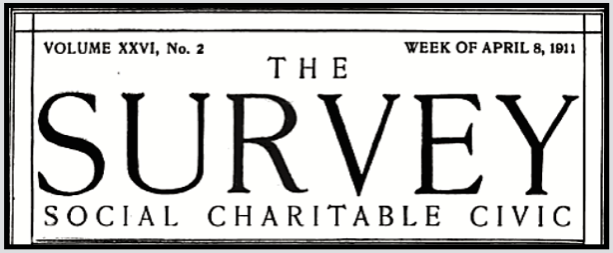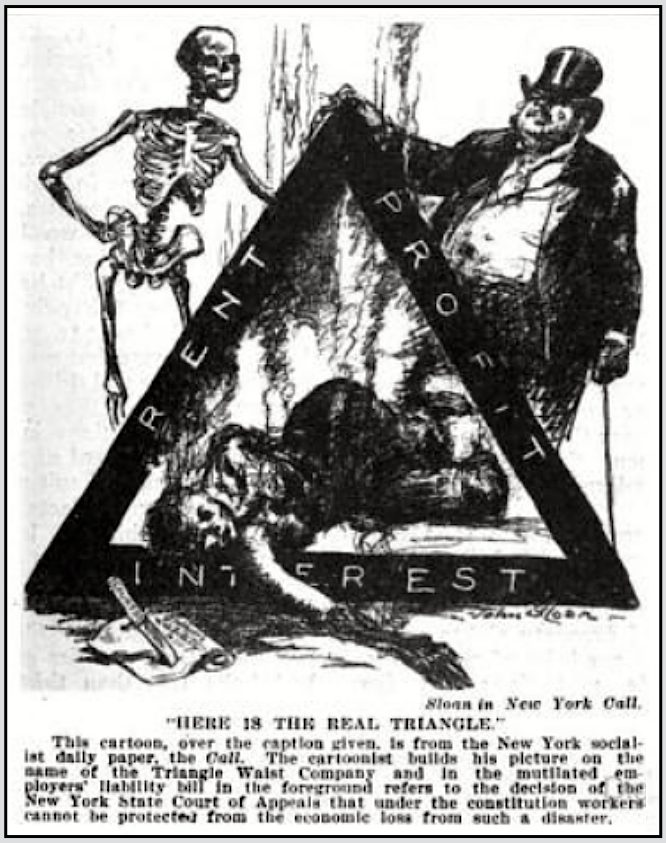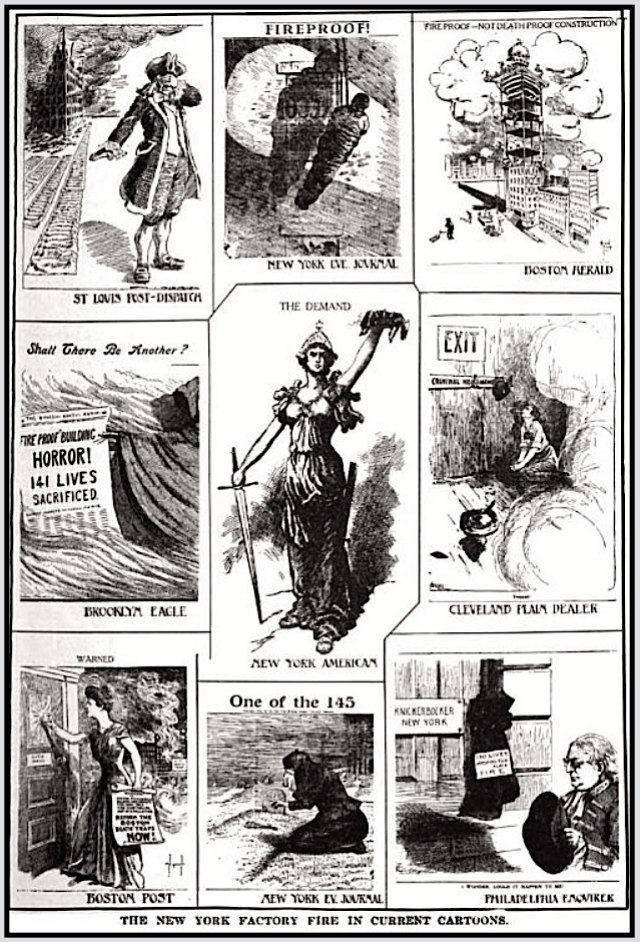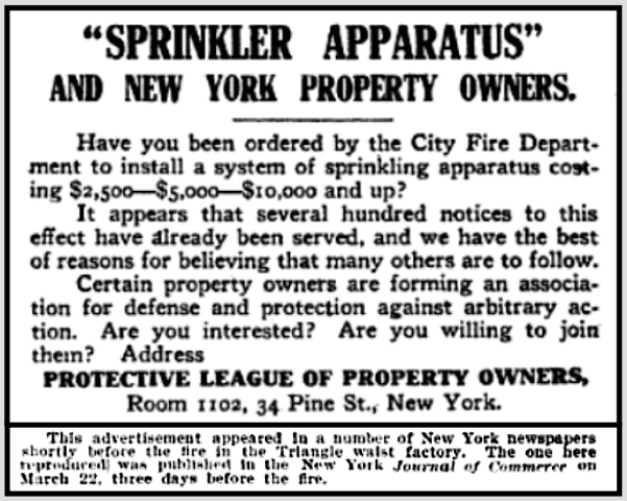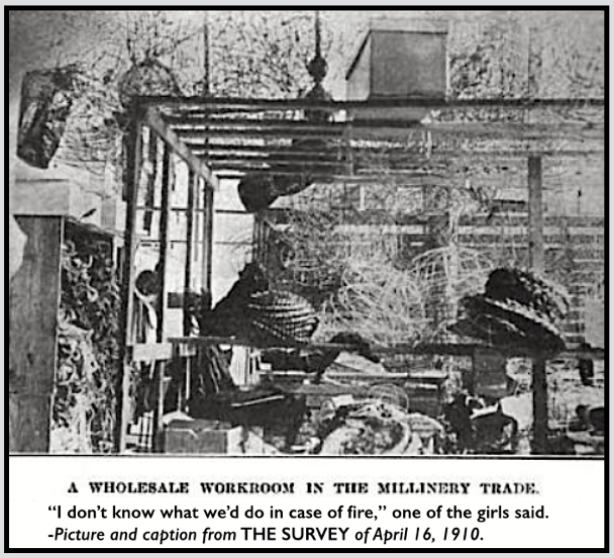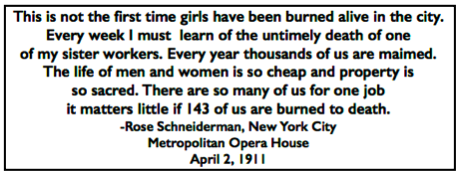 —————
—————
Hellraisers Journal – Sunday April 9, 1911
Mass Meeting at Metropolitan Opera House Stands for Fire Prevention
From The Survey of April 8, 1911:
THE COMMON WELFARE
PREVENTION OF FACTORY FIRES
Prevention was the keynote of the whole week in discussion of the Triangle factory fire in New York and in other industrial cities which have begun to take stock of their risks. There were many meetings, chief of which was the citizens’ mass meeting at the Metropolitan Opera House, reported on succeeding pages, which resulted in the appointment of a committee of five made up of Eugene A. Philbin, chairman; Mary A. Dreier, Edward T. Devine, William Jay Schieffelin, Lillian D. Wald, and Peter Brady. The New York American has organized a committee on prevention of which Ernest Flagg, an eminent architect, is chairman and the other members are Fire Chief Croker, P. Tecumseh Sherman, formerly state commissioner of labor, and William Archer, a builder.
A conference under call of R. Fulton Cutting, president of the Association for Improving the Condition of the Poor, appointed a committee consisting of Mr. Cutting, Franklin B. Kirkbride, Leopold Plaut, Homer Folks and John A. Kingsbury which, in conjunction with the mass meeting committee, is organizing a permanent body on fire prevention.
On Wednesday (after this issue had gone to press) public burial was given the eight unclaimed bodies and the workers of the city planned an enormous silent parade in their honor.
One of the events of the week was the opening of the Triangle Waist Company in another building. A violation of the law was immediately filed against it for installing a row of sewing machines in front of the exit to the fire-escapes. The proprietor asked the Ladies ‘ Shirtwaist Union to organize his shop, but no action was taken.
CITIZENS’ MASS MEETING STANDS FOR PREVENTION
The first step toward formulating plans of constructive work for fire prevention was taken in the practical resolutions passed at a citizens mass meeting held at the Metropolitan Opera House, April 2, under the auspices of the Committee of Fifty appointed at the instigation of the,Women’s Trade Union League immediately after the fire. The great auditorium was filled, and the audience, many of whom came from the East Side, showed its desire for permanent results.
As treasurer of the New York State Chapter of the Red Cross, Jacob H. Schiff opened the meeting with the announcement that the relief fund had reached $75,000 and all present needs were being met. The chairman of the meeting, former District Attorney Eugene A. Philbin, read a letter of regret from the governor and introduced the first speaker, Bishop David H. Greer, who expressed the hope that as this meeting was called not for punishment, but for prevention, it would result in the establishment of a permanent vigilance committee that should faithfully, continuously, and effectively see that the law was enforced. Rabbi Stephen S. Wise brought out the underlying civic and labor issues which this spectacular sorrow had brought to the fore. In a spirit of contrition he dwelt on the fundamental responsibility of the public, and especially of the men of the community, for those who now work involuntarily in places left unsafe by “laws that are no laws and by enforcement that is no enforcement.” His address is published in full on page 93.
As an economist, Prof. E. R. A. Seligman of Columbia pointed out that in matters of safety the police power of the state is unquestioned and no considerations of property rights or personal liberty need interfere with securing ample protection: that from an economic standpoint the cost of safety provision would not fall on the individual employer. As the sanction is social, so the cost becomes social, and in so far as standards are enforced by law, they must be met by all employers alike and become part of the price of the product. He believed that the accident of March 25 should lead to such adequate protection of factory buildings as the Iroquois fire had led to in theaters, and felt that a first step toward the work of protection should be the concentration of administrative power and the appointment of experts. On the last point Comptroller William J. Prendergast said he was heartily in agreement, but questioned the advisability of adding responsibility for preventing fires to the heavy administrative load of the fire commissioner as head of the extinguishing force of the city. He spoke also of the need of a more generous budget appropriation for those things which would improve conditions of life and labor in New York.
The most practical contribution of the meeting was Henry Moskowitz’s figures in regard to fire conditions in New York factories. Two sets were given, the first being taken from letters of complaint sent in to a sub-committee of five appointed the week before. These described conditions in eighty buildings with some 40,000 inmates. They indicated that twenty-two had no fire-escapes, twenty-nine had obstructed fire-escapes, only eight had more than one fire-escape; thirty-five had nailed or barred windows; twenty-six locked doors, fifty doors that opened in; fifty-one had wooden and thirty-six had dark stairways. The other set of figures covered fire conditions in 1,243 shops gathered by the Board of Sanitary Control in the cloak and suit makers’ trade. These were verified facts based on investigation in this one branch of the garment industry. They showed fourteen buildings with no fire-escapes, forty-one obstructed, and 101 not fully equipped with ladders. Only 195 shops had more than one fire-escape. Sixty had halls less than thirty-six inches wide; fifty-eight had dark stairways. In 1,173—very nearly the total number—the doors opened in; in twenty-three they were kept locked. Only one shop had a fire drill .
RESPONSIBILITY IS ON ALL CITIZENS
The majority of the speakers put the responsibility for improving conditions on the citizens of New York, in whose name the meeting was called. Father William J. White, supervisor of Catholic charities of Brooklyn, was the first to suggest that the interest of a body so loosely knit together is apt by its very nature to be transitory. He felt that the group to whom protection in the factory must always be of vital importance were the workers themselves in their trade unions. This view was even more pointedly expressed by Peter Brady, representative of the Allied Printing Trades, who told how a Newark union of women workers had within the last two months forced their employers to put in adequate fire protection and how the Central Federated Union of New York was working out plans of organization through assembly districts that would enable the unions to get better control over both legislation and enforcement of the law. He urged that to union representatives be given the powers of fire inspectors.
[Rose Schneiderman Speaks]
In many ways the most dramatic utterances of the afternoon were the simply spoken but unforgettable words of Rose Schneiderman, vice-president of the Women’s Trade Union League. She spoke as a worker of this tragedy of the workers:
I would be a traitor to these poor burned bodies if I came here to talk good fellowship. We have tried you good people of the public and we have found you wanting. The old Inquisition had its rack and its thumbscrews and its instruments of torture with iron teeth. We know what these things are today; the iron teeth are our necessities, the thumbscrews the high-powered and swift machinery close to which we must work, and the rack is here in the firetrap structures that will destroy us the minute they catch on fire.
This is not the first time girls have been burned alive in the city. Every week I must learn of the untimely death of one of my sister workers. Every year thousands of us are maimed. The life of men and women is so cheap and property is so sacred. There are so many of us for one job it matters little if 143 of us are burned to death.
We have tried you citizens; we are trying you now, and you have a couple of dollars for the sorrowing mothers and brothers and sisters by way of a charity gift. But every time the workers come out in the only way they know to protest against conditions which are unbearable the strong hand of the law is allowed to press down heavily upon us.
Public officials have only words of warning to us-warning that we must be intensely orderly and must be intensely peaceable, and they have the workhouse just back of all their warnings. The strong hand of the law beats us back, when we rise, into the conditions that make life unbearable.
I can’t talk fellowship to you who are gathered here. Too much blood has been spilled. I know from my experience it is up to the working people to save themselves. The only way they can save themselves is by a strong working-class movement.
The resolutions were presented by William Jay Schieffelin, chairman of the Board of Sanitary Control of the Cloak and Suit Makers’ Trade. They were vigorous in demanding a revolution in safety standards and in laws and enforcement, practical in providing for a permanent vigilance committee and in calling for a conference of mayors on fire prevention and human conservation (similar to the House of Governors), and reached to the fundamental forces of prevention in recommending on the one hand joint boards of employers and employes, like that in the cloakmaking industry, to inspect and enforce factory standards, and on the other workingmen’s compensation legislation which would make safety an ever present matter of self-interest to the employers. The resolutions were as follows:
Whereas, it should be realized that the Washington place disaster was due to neglect on the part of the whole community; and whereas a repetition of the calamity can be prevented only by the citizens doing their part in securing the enactment of effective laws and their stringent enforcement, therefore, be it
Resolved, that while we call upon the city officials to exercise immediately all their powers under the building code to require that all factory and loft buildings be put into a safe condition, and to make an adequate increase in the number of inspectors, invoking if necessary the peremptory power of the Board of Health;
That we call upon the Legislature immediately to create the bureau of fire prevention, recommended by the fire commissioner;
That we petition the Board of Estimate to make sufficient appropriation to enable the Fire Department to develop immediately the work of fire prevention;
That we ask the Board of Aldermen not to relax the fire rules against overcrowding and standing in rear aisles in theaters and moving-picture shows, and to adopt similar rules requiring sufficient aisle space for access to fire exits in stores, factories, and workshops;
That we recognize as fundamental the following safeguards: Compulsory fire drills, adequate fireproof exits, unlocked doors opening outward, fire alarms, automatic sprinklers, regular inspection, and testing of apparatus;
That we commend to employers and employes the plan now in operation in the cloak-making industry, giving power to a joint board to inspect factories and to enforce the standards of safety;
That we favor as the most effective means of preventing accidents to working people the plan which invokes the self-interest of employers by a system of workmen’s compensation, such as is in force in other civilized countries;
That the mayor of New York be asked to call a conference on fire prevention, extending invitations to mayors, fire chiefs, and fire experts throughout the country;
That the chairman of this meeting appoint a committee of five with power to co-operate with other organizations and committees to appoint a permanent committee, to the end that there may be a continued effort to secure these vital requirements.
A succession of socialist and labor meetings culminated in the cloakmakers’ mass meeting on April 2 and a Cooper Union meeting under the auspices of the local New York Socialist Party [March 31st]. The protest presented at the latter by Morris Hilquit, the chairman, typifies the attitude of the workers and the socialists as expressed at all of the meetings. Mr. Hilquit [Hillquit] declared:
We protest against the wanton and ceaseless murder of our sons and daughters in factories, mines and mills, and we declare that if the capitalists class cannot conduct the industries of the country without murder, the workers will assume the management of the industries and conduct them with safety to the employes and for the good of the community.
We protest against the systematic slaughter of all labor laws by the courts and we declare that if they persist in cutting off all peaceful avenues of progress, theirs will be the blame if the people of this country are forced into paths of revolution.
CONDITIONS IN TRIANGLE SHOP
The shirtwaist strike in New York in the winter of 1909-10 began in the shop of the Triangle Waist Company where the fire occurred. In the notes taken in the investigation of the strike made for The Survey by Dr. Woods Hutchinson and by Mary Van Kleeck and Alice P. Barrows, whose general results were given in The Survey of January 22, 1910, various significant entries are found describing conditions in the Triangle shop.
One girl striker tells of the door being locked to keep the girls from refusing to stay for night work. The story told by another is like a forecast: “Once on Sunday—we had to work on Sunday from eight to four—there was a fire on the eighth floor. I was on the ninth. They locked the door on the ninth floor and kept us there till the fire was out. It was awful. Some of the girls got their fingers stuck in the needles, they were so frightened.”
Again, on entering the shop the investigators record that they found “part of the top—the tenth-floor full of packing cases, piled in a disorderly way near the exits. There was one elevator an a narrow stairway.” One of the most intelligent of the girls who took part in the strike adds this to the statement in regard to the practice of allowing inflammable rubbish to collect. “Every Sunday,” she says, “they used to sweep the floor and it made a bad dust. Girls tried to cover their heads with the rags from under the tables, but the boss would not allow it. They left these rags under the table during the week until the ragman came around.”
The Triangle fire has established the fact that, so far as the saving of life is concerned, a building is only as fireproof as its contents. In the vast majority of women’s trades—millinery, garments, underwear, neckwear, feathers, flowers, paper boxes, textiles, laundry work, the department store—highly inflammable materials are used. The law, based on sanitary considerations alone, which requires but 250 cubic feet of space for each individual, allows of the rapid leaping of fire through a roomful of such material. The Congestion Commission has recommended that the space requirement be double what it now is.
The accompanying illustrations from millinery shops, taken from THE SURVEY of April 16, 1910, show both how hopeless rapid exit would be with our present perfectly legal room congestion in factories, and also what flame conductors many of the materials used in these factories are.
—————
[Emphasis added.]
~~~~~~~~~~~~~~~~~~~~~~
SOURCE & IMAGES
The Survey, Volume 26
Social, Charitable, Civic, a Journal of Constructive Philanthropy
Apr-Sept 1911
Charity Organization Society of the City of New York, 1911
https://books.google.com/books?id=OrpIAAAAYAAJ
The Survey-Apr 8, 1911
https://play.google.com/books/reader?id=OrpIAAAAYAAJ&hl=en&pg=GBS.PA76-IA3
p81-86: re Triangle Fire
https://play.google.com/books/reader?id=OrpIAAAAYAAJ&hl=en&pg=GBS.PA81
p84: “We Have Found You Wanting” by Speech Rose S.
https://play.google.com/books/reader?id=OrpIAAAAYAAJ&hl=en&pg=GBS.PA84
See also:
Tag: Triangle Shirtwaist Factory Fire
https://weneverforget.org/tag/triangle-shirtwaist-factory-fire/
Survey, Apr 8th, page 93: “In Letters of Fire”
-Speech of Rabbi Stephen S. Wise
Metropolitan Opera House, April 2, 1911
https://play.google.com/books/reader?id=OrpIAAAAYAAJ&hl=en&pg=GBS.PA93
-re Hillquit’s speech at Cooper Union on March 31st:
(Note NY Times states meeting was called by Collegiate Equal Suffrage League.)
The Triangle Fire
by Leon Stein
Cornell University Press, 1962
(search: “cooper union” hillquit)
https://books.google.com/books?id=zMu0zgnfNAUC
Apr 1, 1911, NY Times re March 31 meeting at Cooper Union
-Hillquit speaks re Triangle Fire
https://www.newspapers.com/clip/75422940/apr-1-1911-ny-times-re-march-31/
Hillquit also spoke on March 29th at Grand Central Palace
From New York Call of March 30, 1911
“Great Throng of Workers Pack Memorial Meeting; Many Faint”
Held by Waist Makers’ Union (ILGWU Local 25)
https://www.marxists.org/history/usa/workers/triangle-fire/ch04.htm
~~~~~~~~~~~~~~~~~~~~~~~~~~~~~~~~~~~~~
Triangle Factory Fire – James Power

